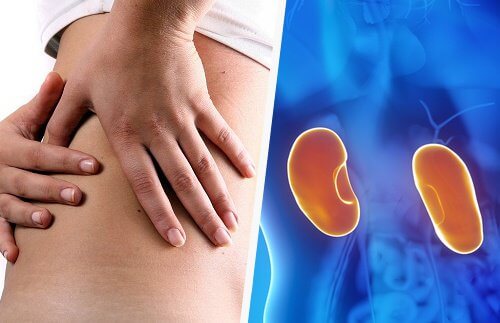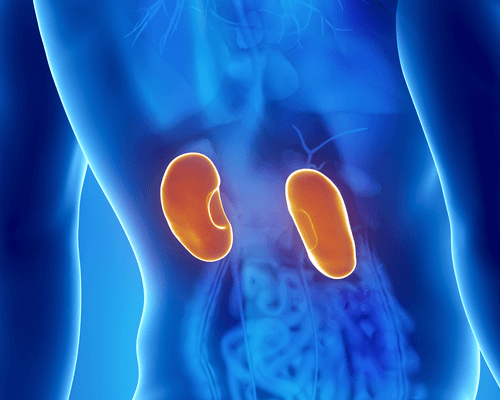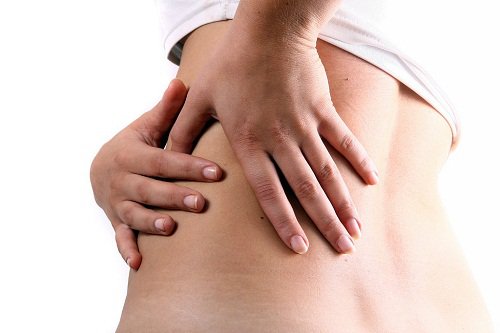The Symptoms of Kidney Infections in Women

Because of women’s anatomy, we’re more prone to kidney infections. Just a simple urinary tract infection can become complicated, travel to one of the kidneys, and cause the unpleasant consequences that some of us are unfortunate enough to already know about.
In this article, we’ll take a look at the symptoms of kidney infections in women so you can be more prepared.
What causes kidney infections?

The symptoms of a kidney infections often appear very suddenly and change from one day to the next without warning. Most women are surprised when they’re diagnosed with a kidney infection, but they’re actually quite common.
These infections can occur for many reasons. Pay attention:
- The most common cause is a bladder infection that never heals properly. Sometimes, this is because you don’t follow the proper course of treatment. Many women try to self-medicate, for example, and that’s definitely not a good idea.
There’s an appropriate antibiotic for every type of bacteria that causes an infection – they’re not all the same. That’s why it’s important that you see your doctor so that your bladder infection can be completely cured before it has a chance to travel to your kidneys.
- These infections also occur simply because of women’s anatomy. Because of this, it’s important to maintain proper hygiene to avoid getting them. However, be careful – too much cleaning is also harmful and can eliminate the beneficial bacteria that helps maintain the body’s natural balance. You should also be careful during sexual activity to prevent infections.
- Polycystic kidneys can also be the origin of these infections.
- Diabetes is another factor to consider.
- A history of kidney stones is definitely a predictor of kidney infections.
- Finally, low defenses or a weakened immune system is another risk factor.
Symptoms of a kidney infection
 1. Unexplained tiredness
1. Unexplained tiredness
When it comes to kidney infections, the fatigue comes on slowly.
Sure, it’s normal to have days when we feel more tired than usual: during our periods, if we have a migraine…However, in the case of a kidney infection, you’ll find that over time you lose all your strength. It’s almost like you’ve been hit by a train, and you only find relief when you can sit or lie down.
- The fatigue will be progressive, meaning that every day it gets worse and you have no days where you suddenly start to feel better.
- It’s also clearly not related to stress or the amount of physical activity you’re getting.
- No medication offers you relief, and you find it difficult to complete your day to day activities.
2. Different types of pain

Kidney infections usually cause different kinds of discomfort that you should learn to recognize:
- Pain on both sides of the abdomen.
- Pain that sometimes radiates to the groin, and pressing on the region provides temporary relief.
- Severe lower back pain, usually on one side. It may feel like a hot disc in the area.
- Intermittent but intense headaches.
3. Changes in urine
Another common symptom of a kidney infection is the constant urge to go to the bathroom. Every time you urinate, you still have the need to go again.
In addition, the urine tends to take on a different color, like coca cola. This is a sign that there might be blood or pus in it.
Plus, the simple act of urinating is quite painful.
You might be interested in: What the Color of Your Urine Says about Your Health
4. Watch out for a fever
Just a few degrees of a fever can be a warning that something is happening in the body, especially an infection. If you have any of the above symptoms plus a fever, the sooner you can go to your doctor, the better.
This is usually a clear sign that you’re suffering from a kidney infection.
5. Loss of appetite

A lot of times your extreme tiredness will be accompanied by a loss of appetite. You may not crave anything elaborate – not even a simple salad.
However, what’s more common is that you’ll feel extremely thirsty. That’s because infections dry out the body more and make you crave more fluids.
6. Rapid pulse
A rapid heartbeat, or tachycardia, is a direct consequence of fever and infection.
The body responds quickly to the attack and this makes your heart work faster. This also contributes to the fatigue.
7. Nausea and vomiting
If you’ve reached a stage where you’re experiencing nausea and vomiting, this is a sign of a more advanced kidney infection. You’ll begin to have problems with digestion and may even become intolerant of certain foods. This can lead to more weakness, tremors, fatigue, and more…
Try not to let it get this far. You can usually identify a kidney infection fairly early on if you’re experiencing a fever, tiredness, pain in the lower back, and blood in your urine.
Also read: Teas that Fight Digestion Problems

Always remember that it’s your doctor who will prescribe the most suitable and appropriate course of treatment. Normally, antibiotics will be needed to resolve a kidney infection, but regardless, always follow the advice of a medical professional.
In the meantime, make sure you eat right, get plenty of rest, and don’t worry. You’ll make a full recovery soon!
This text is provided for informational purposes only and does not replace consultation with a professional. If in doubt, consult your specialist.








